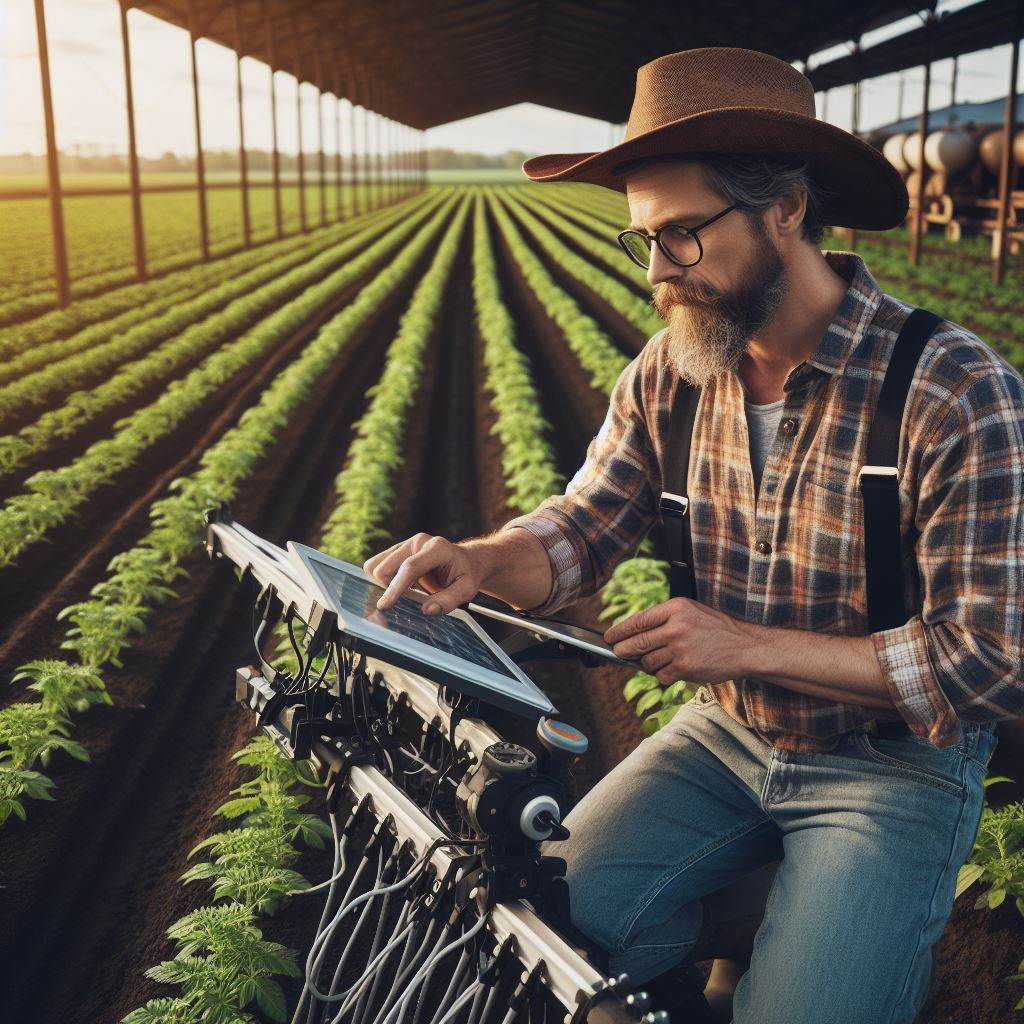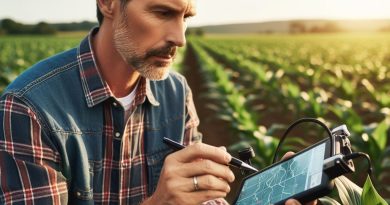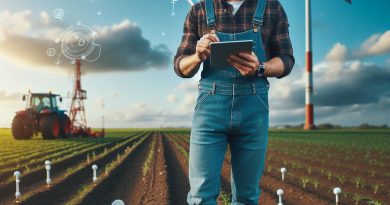Precision Agri: Boosting Yield Sustainably
Last Updated on January 22, 2024
Introduction
Precision agriculture offers exciting solutions for growing more food sustainably.
This data-driven approach uses technologies like GPS, remote sensing, and AI to optimize crop management.
By gathering detailed insights about conditions across the land, farmers can tailor interventions to maximize yields while minimizing environmental impact.
For example, variable rate technology allows precise targeting of water, fertilizer and pesticides only where needed.
GPS-guided equipment automates tasks like weeding and harvesting with precision.
Meanwhile, analyzing data on weather, soil chemistry, and growth metrics informs proactive decision making.
The potential benefits are immense: higher yields, lower costs, and reduced chemical usage that rewards both farmers and the planet.
But unlocking the promise of precision agriculture requires an openness to innovation and collaboration across stakeholders.
Done thoughtfully, technological advancements can improve upon agricultural knowledge accumulated over generations.
Blending old wisdoms and new is key.
With care and creativity, data-enabled farming can nourish growing populations while conserving resources for the future.
The time is now to leverage these tools sustainably.
Understanding Precision Agriculture
In this section, we will delve into the definition and concept of precision agriculture, the role of technology and data analysis, as well as the benefits and advantages it offers.
Definition and Concept of Precision Agriculture
- Precision agriculture is an innovative approach to farming that utilizes technology and data analysis.
- It involves the use of sensors, GPS, drones, and other advanced tools to gather data.
- This data is then analyzed to make informed decisions and optimize farming practices.
- The concept revolves around applying inputs, such as water, fertilizers, and pesticides, precisely where and when they are needed.
- By doing so, precision agriculture aims to maximize crop yield while minimizing waste and environmental impact.
Role of Technology and Data Analysis
- Technology plays a crucial role in precision agriculture, enabling farmers to collect accurate and real-time data.
- Sensors placed in the fields measure soil moisture, temperature, nutrient levels, and crop growth.
- GPS technology allows farmers to precisely map their fields and track the application of inputs.
- Drones equipped with cameras and sensors provide aerial imaging, helping identify crop health issues.
- Data analysis software processes the collected data, turning it into actionable insights for decision-making.
Benefits and Advantages of Precision Agriculture
- Improved Efficiency: Precision agriculture optimizes resource allocation, reducing input waste and costs.
- Increased Yield: By providing crops with precise amounts of essential inputs, yields are maximized.
- Better Quality: Controlled application of inputs ensures crops receive optimal conditions for growth.
- Environmental Sustainability: Precision agriculture reduces chemical use, water consumption, and soil erosion.
- Enhanced Pest and Disease Management: Monitoring tools help identify issues early, preventing crop damage.
- Smart Irrigation: Sensors assess soil moisture levels, allowing farmers to water crops as needed.
- Cost Savings: By applying inputs only where necessary, farmers save on expenses for unnecessary treatments.
Overall, precision agriculture combines technology, data analysis, and careful resource management to boost yield sustainably.
It harnesses the power of innovation to enhance efficiency, productivity, and environmental stewardship in farming.
By embracing precision agriculture, farmers can achieve better crop yields, reduce costs, and minimize their ecological footprint.
Next, we will explore the various technologies and tools used in precision agriculture, including their benefits and applications.
Read: Precision Agri: The Tech Revolution
Sustainable Agriculture Practices
The Concept of Sustainable Agriculture
- Sustainable agriculture is a farming practice that aims to meet the present needs without compromising future generations.
- It focuses on protecting the environment, improving livelihoods for farmers, and ensuring food security for all.
- The goal is to create a balance between economic profitability, social equity, and environmental stewardship.
Importance of Reducing Environmental Impact
- Conventional farming methods often lead to negative environmental consequences such as soil erosion, water contamination, and biodiversity loss.
- These practices contribute to climate change and have a significant impact on the overall ecological system.
- Reducing environmental impact is vital to preserve natural resources, promote ecological diversity, and mitigate climate change.
The Need for Precision Agriculture in Sustainable Farming
- Precision agriculture refers to the use of advanced technology and data analytics in agricultural practices.
- It allows farmers to make informed decisions about resource allocation, minimizing waste, and maximizing productivity.
- Precision agriculture enables precise application of inputs like fertilizers, pesticides, and water, reducing their overall usage.
- By adopting precision agriculture techniques, farmers can optimize yields while minimizing environmental impact.
- Real-time monitoring, GPS-guided machinery, and remote sensing technologies are key components of precision agriculture.
- These tools provide valuable insights into crop health, soil moisture levels, and yield potential, enabling efficient resource management.
- Precision agriculture practices also allow farmers to tailor their farming approaches according to specific field conditions.
- This customized approach helps in reducing input costs, increasing overall efficiency, and minimizing negative environmental impacts.
- Additionally, precision agriculture can aid in early pest and disease detection, leading to timely interventions and reduced reliance on chemicals.
- By integrating digital technologies and data-driven decision-making, sustainable farming becomes more achievable.
In short, sustainable agriculture practices are crucial for the long-term viability of the farming industry.
Reducing environmental impact and adopting precision agriculture techniques play vital roles in achieving sustainability goals.
Through precision agriculture, farmers can optimize productivity, minimize resource wastage, and reduce the overall ecological footprint.
By embracing these practices, we can ensure a sustainable future for agriculture, benefiting both farmers and the environment.
Read: Precision Agriculture: How Drones Change the Game
Boosting Yield with Precision Agriculture
Precision planting and crop management techniques
Precision agriculture techniques, such as precise seed placement, can significantly enhance crop yield by ensuring optimal growing conditions.
Utilizing advanced technologies, farmers can precisely measure and control variables like seed depth, spacing, and population.
Accurate timing of planting operations, based on soil conditions and weather forecasts, enables maximum crop development.
Using remote sensing and satellite imagery for yield optimization
Remote sensing and satellite imagery provide valuable data on crop health, helping farmers make informed decisions.
Through aerial mapping, farmers can identify variations within their fields and address them accordingly.
Satellite imagery assists in monitoring crop development, detecting pest infestations, or identifying nutrient deficiencies early on.
Applying variable-rate fertilization and irrigation methods
Precision agriculture allows farmers to tailor the application of fertilizers and irrigation to meet specific crop requirements.
By analyzing soil and plant data, farmers can apply the appropriate amount of nutrients and water.
Variable-rate technology ensures that resources are distributed efficiently, minimizing wastage and environmental impact.
Utilizing precision spraying and pest management strategies
Precision spraying techniques enable targeted application of pesticides, minimizing chemical usage and reducing environmental harm.
Through GPS-guided equipment, farmers can accurately spray only the areas affected, reducing unnecessary chemical exposure.
Integrated pest management strategies combine multiple tactics to control pests, such as biological control or pheromone traps.
Precision agriculture offers numerous benefits for boosting yield sustainably while minimizing resource wastage and environmental impact.
By implementing precision planting, utilizing remote sensing and satellite imagery, applying variable-rate methods, and utilizing precise spraying techniques, farmers can optimize crop productivity.
These techniques enable farmers to make data-driven decisions, resulting in better resource utilization, increased yield, and reduced production costs.
As technology continues to evolve, precision agriculture will play an increasingly important role in feeding the world’s growing population.
Read: Agri Robots: Revolutionizing Precision Agriculture
Environmental Benefits
Reducing fertilizer and chemical use
Precision agriculture not only boosts yield but also provides numerous environmental benefits.
By utilizing innovative technologies and practices, farmers can reduce the use of fertilizers and chemicals.
This, in turn, minimizes soil erosion and nutrient runoff into nearby water bodies, protecting water quality and aquatic ecosystems.
Enhancing water and energy efficiency
Additionally, precision agriculture enhances water and energy efficiency.
Farmers can precisely monitor soil moisture levels and weather conditions, enabling them to optimize irrigation and reduce water consumption.
This not only conserves water but also reduces energy usage associated with pumping and distributing water.
Promoting biodiversity and natural resource conservation
Promoting biodiversity and natural resource conservation is another major environmental benefit of precision agriculture.
By adopting precision farming techniques, farmers can implement targeted pest and weed control strategies.
This reduces the need for broad-spectrum pesticides, preserving beneficial insects and promoting biodiversity.
Moreover, precision agriculture facilitates the implementation of precision conservation practices.
Farmers can employ site-specific management techniques to protect sensitive areas such as wetlands, waterways, and forests.
This ensures the preservation of natural resources and habitats.
Environmental benefits of precision agriculture
Precision agriculture plays a significant role in sustainable farming practices.
It offers a range of environmental benefits including:
- Reducing fertilizer and chemical use: Precision technologies enable farmers to apply fertilizers and chemicals only where necessary, resulting in reduced environmental contamination.
- Minimizing soil erosion and nutrient runoff: By precisely managing irrigation and fertilization, farmers can prevent soil erosion and minimize the loss of nutrients into water bodies.
- Enhancing water and energy efficiency: Advanced monitoring and control systems enable farmers to optimize water usage, conserving this valuable resource and reducing energy consumption associated with irrigation.
- Promoting biodiversity and natural resource conservation: Precision agriculture allows farmers to implement targeted pest control strategies, preserving beneficial insects and promoting biodiversity.
- Implementing precision conservation practices: Site-specific management techniques can be employed to protect sensitive areas and minimize the impact on natural resources and habitats.
Essentially, precision agriculture not only improves yield but also provides significant environmental benefits.
By reducing the use of fertilizers and chemicals, minimizing soil erosion and nutrient runoff, enhancing water and energy efficiency, and promoting biodiversity and natural resource conservation, precision agriculture offers a sustainable solution for the agricultural sector.
Adopting these practices can help safeguard the environment for future generations while ensuring food production meets the ever-growing global demand.
Read: AI in Farming: Precision Ag Revolution

Economic Benefits
Maximizing crop yield and profitability
Precision agriculture techniques allow farmers to maximize their crop yield and ultimately increase their profitability.
By using advanced technologies such as sensors, drones, and satellite imagery, farmers can monitor various factors such as soil moisture, nutrient levels, and pest infestations.
This data-driven approach enables them to make informed decisions about planting, fertilizing, and applying pesticides, leading to higher crop yields.
Cost-saving through optimized resource allocation
Precision agriculture helps farmers reduce input costs by optimizing resource allocation.
With the help of technology, farmers can precisely determine the required amount of fertilizers, water, and pesticides based on the specific needs of each crop.
This precision in resource allocation minimizes waste and reduces unnecessary expenses, resulting in significant cost savings for farmers.
Improved risk management and decision-making
Precision agriculture empowers farmers to better manage risks and make informed decisions.
By continuously monitoring crop conditions, farmers can identify potential issues early on, such as disease outbreaks or water stress.
With this information, farmers can take proactive measures to mitigate risks, ensuring the health and productivity of their crops.
Additionally, the data collected can be used for predictive analytics, enabling farmers to make more accurate forecasts and plan accordingly.
Expanding market opportunities for sustainable produce
With the increasing consumer demand for sustainable and traceable food products, precision agriculture opens up new market opportunities for farmers.
By adopting sustainable farming practices, such as precision irrigation, integrated pest management, and conservation tillage, farmers can produce high-quality and environmentally-friendly crops.
They can then market these products as sustainable, organic, or locally grown, appealing to consumers who value such attributes.
This differentiation allows farmers to command premium prices and tap into niche markets, ultimately increasing their profitability.
In general, precision agriculture offers numerous economic benefits for farmers.
By maximizing crop yield and profitability, farmers can achieve higher returns on their investments.
Cost-saving through optimized resource allocation helps them reduce expenses and improve their bottom line.
Furthermore, precision agriculture enables improved risk management and decision-making, minimizing potential losses and maximizing opportunities.
Lastly, by embracing sustainable practices, farmers can unlock new market opportunities and cater to the increasing demand for sustainable produce.
As precision agriculture continues to evolve and integrate with emerging technologies, its economic benefits will only become more pronounced in the future.
Case Studies and Examples
In this section, we will delve into some case studies and examples that highlight successful precision agriculture initiatives.
These real-life examples will showcase how precision agriculture has contributed to sustainable yield boosting.
Furthermore, we will discuss the positive impact these initiatives have had on both farmers and the environment.
The Case of Farmers Union Coop
Farmers Union Coop, a large agricultural cooperative, implemented precision agriculture techniques on their farms.
By using GPS technology and soil sensors, they were able to precisely apply fertilizers and irrigation, resulting in a 20% increase in crop yields.
John’s Farm
John, a small-scale farmer, embraced precision agriculture to improve his farming practices.
Through the use of drones equipped with advanced imaging systems, he identified areas of his fields with nutrient deficiencies.
By addressing these specific areas, John experienced a 30% increase in overall crop yield.
GreenTech Solutions
This agricultural technology company developed a smart irrigation system that utilizes weather data and soil sensors.
The system automatically adjusts irrigation levels based on weather patterns and soil moisture content.
Farmers who implemented this system witnessed a reduction in water usage by up to 40% while still maintaining high crop yields.
Sustainable Weed Management
Precision agriculture techniques have also been employed to tackle weed management sustainably.
By utilizing advanced imaging techniques and machine learning algorithms, farmers are able to identify weeds in their fields and precisely apply herbicides, reducing chemical usage by 50% and minimizing the impact on the environment.
Environmental Benefits
Precision agriculture initiatives have proven to be environmentally friendly.
By using data-driven decision-making processes, farmers are able to minimize the use of fertilizers, pesticides, and water, reducing chemical runoff and water pollution.
This not only benefits the environment but also promotes long-term soil health and biodiversity.
Economic Advantages
Farmers who have adopted precision agriculture techniques have reported significant economic benefits.
By optimizing inputs such as fertilizers and water, the cost of production decreases, resulting in higher profits.
Additionally, precision agriculture enhances crop quality, enabling farmers to command better prices in the market.
Farming at Scale
Large-scale farming operations have also seen success with precision agriculture.
By utilizing satellite imagery and automated machinery, large farms are able to monitor crop health, apply inputs accurately, and manage resources efficiently.
This leads to increased productivity on a larger scale, ensuring food security for a growing population.
Government Support
Governments around the world are recognizing the potential of precision agriculture and providing support to farmers.
Through subsidies, grants, and training programs, they are encouraging the adoption of these sustainable farming practices.
This further incentivizes farmers to embrace precision agriculture and contribute to increasing food production sustainably.
In essence, precision agriculture has proven to be an effective approach for boosting yield sustainably.
The case studies and examples discussed in this section demonstrate the positive impact of precision agriculture initiatives on both crop yields and the environment.
By adopting data-driven practices and leveraging technology, farmers can optimize their inputs, reduce costs, and minimize their environmental footprint.
Governments and agricultural organizations play a crucial role in promoting and supporting precision agriculture, ensuring a sustainable future for agriculture.
Future Opportunities and Challenges
As precision agriculture continues to evolve, there are numerous opportunities and challenges that lie ahead.
Potential advancements in precision agriculture
- Integration of artificial intelligence and machine learning for data analysis and decision-making.
- Development of advanced sensor technologies for improved data collection and monitoring.
- Utilization of drones and robotics for precise and efficient farm management.
- Implementation of blockchain technology for transparency and traceability in the agricultural supply chain.
- Exploration of sustainable farming practices to reduce environmental impact and promote long-term sustainability.
- Enhancement of precision planting techniques for optimal seed placement and crop growth.
Challenges in adoption and implementation
- Cost of implementing precision agriculture technologies and systems.
- Limited access to reliable internet connectivity in rural farming areas.
- Education and training of farmers to understand and effectively use precision agriculture tools.
- Privacy and data security concerns regarding the collection and utilization of farmer data.
- Resistance to changes in traditional farming practices and mindset.
- Maintaining and upgrading precision agriculture equipment to ensure its effectiveness and longevity.
The role of government support and industry collaboration:
- Government support in the form of financial incentives, grants, and subsidies to facilitate the adoption of precision agriculture.
- Collaboration between farmers, technology providers, and researchers to develop tailored solutions for different farming environments.
- Promotion of policies and regulations that foster innovation and sustainable practices in agriculture.
- Partnerships between technology companies and agricultural organizations to bridge the gap between research and implementation.
- Establishment of public-private partnerships to invest in infrastructure development for precision agriculture.
- Creation of platforms for knowledge sharing and exchange of best practices among stakeholders in the agriculture industry.
In a nutshell, the future of precision agriculture is promising, with opportunities for advancements in technology and practices that can greatly benefit farmers and the environment.
However, challenges such as cost, access to resources, and resistance to change need to be addressed.
Government support and industry collaboration play a crucial role in driving the adoption and implementation of precision agriculture.
By working together, stakeholders can overcome challenges and unlock the full potential of precision agriculture for sustainable and productive farming.
Conclusion
Precision agriculture offers numerous benefits for sustainable yield boosting in the farming industry.
Throughout this blog, we have highlighted key points such as the use of advanced technology, data analytics, and targeted farming practices.
Precision agriculture plays a pivotal role in conserving resources, reducing waste, and maximizing productivity for farmers.
By embracing precision agriculture, farmers can optimize crop production, minimize environmental impact, and increase profitability.
It is crucial for farmers and stakeholders to recognize the importance of precision agriculture for a better future.
By adopting these practices, we can ensure food security, protect natural resources, and contribute to a sustainable agricultural system.
Therefore, it is essential for farmers and stakeholders to invest in the necessary tools, technologies, and knowledge to implement precision agriculture.
Let us all work together towards a future where sustainable farming practices are the norm, and precision agriculture becomes the foundation of our agricultural systems.
Together, we can boost yields, conserve resources, and create a more sustainable and prosperous agriculture industry.


